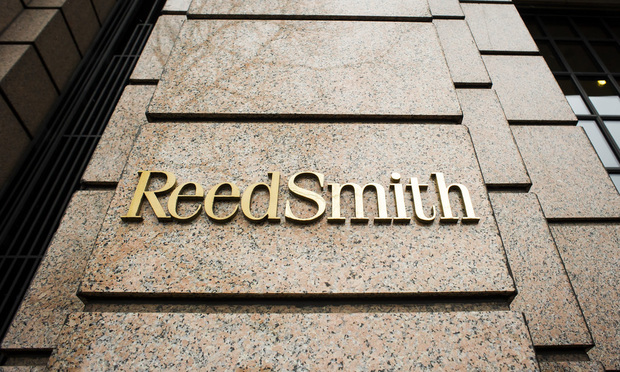Mueller's Team Questions How Files in Russia Case Ended Up Online
Federal prosecutors are resisting a push from a defense team at Reed Smith to more widely share discovery material produced in a criminal case in Washington's federal trial court.
January 30, 2019 at 04:50 PM
6 minute read
 Reed Smith offices in Washington, D.C. Credit: Diego M. Radzinschi/NLJ
Reed Smith offices in Washington, D.C. Credit: Diego M. Radzinschi/NLJ
Updated at 6:14 p.m.
The U.S. law firm representing a Russian business charged in a special counsel's case in Washington should not be permitted to share sensitive information with the company's officers and employees outside the United States, federal prosecutors told a judge Wednesday.
In a new court filing, prosecutors revealed that nonsensitive discovery materials provided to Reed Smith, the U.S. law firm representing the Russian company Concord Management and Consulting, had been altered and disseminated online in October as part of an apparent effort to discredit the investigation into Russian interference in the 2016 election.
The documents were posted publicly from the Twitter account @HackingRedstone, which claimed to have retrieved the papers by hacking into a Russian server. The Twitter account, as of Wednesday afternoon, was “suspended” and not publicly viewable.
Concord's lawyers at Reed Smith have quarreled for weeks with special counsel prosecutors over who can have access to information being produced in the case. The Reed Smith team, led by partners Eric Dubelier and Katherine Seikaly, said in December that prosecutors had produced nearly 4 million documents, and designated 3.2 million of them as “sensitive.”
Dubelier and Seikaly were not immediately reached for comment Wednesday. Prosecutors did not accuse either lawyer, or their law firm, of leaking or otherwise facilitating any unauthorized release of discovery material. Reed Smith said in a statement Wednesday:
“Reed Smith and its lawyers have at all times complied with the protective order in this case. As such, no data was obtained via a breach of Reed Smith systems and we are confident that Reed Smith systems have not been breached. We maintain the highest levels of security and protection for all of our systems and their contents.”
Prosecutors said the public dissemination of nonsensitive discovery illustrated why sensitive materials should not be shared with Concord's officers in Russia.
“Concord's request to send the sensitive discovery to the Russian Federation unreasonably risks the national security interests of the United States,” prosecutors wrote. They added: “Nothing has occurred during the pendency of this litigation to ameliorate these risks. On the contrary, the government's concerns are only heightened by the apparent release and manipulation of information produced to Concord as 'non-sensitive' discovery in this case.”
The government said some of the material online matched certain nonpublic case file markers, and that “the file names and structure of the material produced by the government in discovery are not a matter of public record.”
“The FBI's ongoing review has found no evidence that U.S. government servers, including servers used by the Special Counsel's Office, fell victim to any computer intrusion involving the discovery files,” prosecutors said in their court filing.
Reed Smith said in its statement that the firm has “never hosted or maintained any of the data at issue here produced by the government in the Concord case on Reed Smith computer systems. A third party vendor has hosted all such data and has assured us that there has been no breach of the database that maintains the data.”
Concord Management and Consulting was among the 16 Russian entities and individuals charged in Washington's federal trial court with participating in a scheme to sow discord in the U.S. electorate in 2016. No other law firm other than Reed Smith has entered an appearance for any of the defendants.
 Eric Dubelier of Reed Smith, a lawyer for Concord Management and Consulting LLC, charged in a special counsel's case, exits federal court in Washington, D.C., on June 15, 2018. Credit: Diego M. Radzinschi / National Law Journal
Eric Dubelier of Reed Smith, a lawyer for Concord Management and Consulting LLC, charged in a special counsel's case, exits federal court in Washington, D.C., on June 15, 2018. Credit: Diego M. Radzinschi / National Law Journal“In this first-of-its-kind prosecution of a make-believe crime, the Office of Special Counsel maintains that it can unilaterally—and for secret reasons disclosed only to the court— categorize millions of pages of non-classified documents as 'sensitive,' and prohibit defense counsel from sharing this information with defendant Concord for purposes of preparing for trial,” Dubelier wrote in a court filing in December.
The defense lawyers added: “The position of the court and the Special Counsel creates an insuperable obstacle to defense counsel preparing for trial.”
Featuring prominently in the prosecutors' filing Wednesday was Yevgeny Prigozhin, a Russian oligarch whose restaurants and catering businesses have hosted dinners attended by Vladimir Putin, earning him the nickname “Putin's chef.” As an officer of Concord, Prigozhin was among the Russians charged last year with conspiring to interfere in the 2016 election.
In late June, U.S. District Judge Dabney Friedrich set restrictions on discovery the government deemed sensitive, preventing Reed Smith from sharing such materials without her permission. Friedrich also ordered Reed Smith to store sensitive materials in a locked room at its U.S. offices “when they are not in the actual possession of defense counsel.”
On Wednesday, prosecutors said Prigozhin could potentially view sensitive materials if he traveled to the United States.
“To the extent that Concord faces challenges in mounting its defense, it is because Prigozhin refuses to come to the United States to review the sensitive discovery,” prosecutors wrote. “That is a problem of Concord's own making.”
Read more:
Roger Stone's Legal Team Didn't Exactly Get Off to a Great Start in DC
'Knock It Off': Judge Upbraids Reed Smith Partner Litigating Mueller Case
Tempers Flare at Russia Hearing Over Prosecutor, Defense Phone Call
How Law Firms Are Protecting Sensitive Information in Russia Cases
Reed Smith's Russia Work in Mueller Case Gets Closeup in Court
This report was updated with comment from Reed Smith.
This content has been archived. It is available through our partners, LexisNexis® and Bloomberg Law.
To view this content, please continue to their sites.
Not a Lexis Subscriber?
Subscribe Now
Not a Bloomberg Law Subscriber?
Subscribe Now
NOT FOR REPRINT
© 2025 ALM Global, LLC, All Rights Reserved. Request academic re-use from www.copyright.com. All other uses, submit a request to [email protected]. For more information visit Asset & Logo Licensing.
You Might Like
View All
Trump Fires EEOC Commissioners, Kneecapping Democrat-Controlled Civil Rights Agency

Federal Judge Pauses Trump Funding Freeze as Democratic AGs Plan Suit
4 minute read
Testing Legal Authority, Trump Fires NLRB Member, Leaving Panel Without Quorum
3 minute read
Trending Stories
- 1'Reverse Robin Hood': Capital One Swarmed With Class Actions Alleging Theft of Influencer Commissions in January
- 2Hawaii wildfire victims spared from testifying after last-minute deal over $4B settlement
- 3How We Won It: Latham Secures Back-to-Back ITC Patent Wins for California Companies
- 4Meta agrees to pay $25 million to settle lawsuit from Trump after Jan. 6 suspension
- 5Stevens & Lee Hires Ex-Middle District of Pennsylvania U.S. Attorney as White-Collar Co-Chair
Who Got The Work
J. Brugh Lower of Gibbons has entered an appearance for industrial equipment supplier Devco Corporation in a pending trademark infringement lawsuit. The suit, accusing the defendant of selling knock-off Graco products, was filed Dec. 18 in New Jersey District Court by Rivkin Radler on behalf of Graco Inc. and Graco Minnesota. The case, assigned to U.S. District Judge Zahid N. Quraishi, is 3:24-cv-11294, Graco Inc. et al v. Devco Corporation.
Who Got The Work
Rebecca Maller-Stein and Kent A. Yalowitz of Arnold & Porter Kaye Scholer have entered their appearances for Hanaco Venture Capital and its executives, Lior Prosor and David Frankel, in a pending securities lawsuit. The action, filed on Dec. 24 in New York Southern District Court by Zell, Aron & Co. on behalf of Goldeneye Advisors, accuses the defendants of negligently and fraudulently managing the plaintiff's $1 million investment. The case, assigned to U.S. District Judge Vernon S. Broderick, is 1:24-cv-09918, Goldeneye Advisors, LLC v. Hanaco Venture Capital, Ltd. et al.
Who Got The Work
Attorneys from A&O Shearman has stepped in as defense counsel for Toronto-Dominion Bank and other defendants in a pending securities class action. The suit, filed Dec. 11 in New York Southern District Court by Bleichmar Fonti & Auld, accuses the defendants of concealing the bank's 'pervasive' deficiencies in regards to its compliance with the Bank Secrecy Act and the quality of its anti-money laundering controls. The case, assigned to U.S. District Judge Arun Subramanian, is 1:24-cv-09445, Gonzalez v. The Toronto-Dominion Bank et al.
Who Got The Work
Crown Castle International, a Pennsylvania company providing shared communications infrastructure, has turned to Luke D. Wolf of Gordon Rees Scully Mansukhani to fend off a pending breach-of-contract lawsuit. The court action, filed Nov. 25 in Michigan Eastern District Court by Hooper Hathaway PC on behalf of The Town Residences LLC, accuses Crown Castle of failing to transfer approximately $30,000 in utility payments from T-Mobile in breach of a roof-top lease and assignment agreement. The case, assigned to U.S. District Judge Susan K. Declercq, is 2:24-cv-13131, The Town Residences LLC v. T-Mobile US, Inc. et al.
Who Got The Work
Wilfred P. Coronato and Daniel M. Schwartz of McCarter & English have stepped in as defense counsel to Electrolux Home Products Inc. in a pending product liability lawsuit. The court action, filed Nov. 26 in New York Eastern District Court by Poulos Lopiccolo PC and Nagel Rice LLP on behalf of David Stern, alleges that the defendant's refrigerators’ drawers and shelving repeatedly break and fall apart within months after purchase. The case, assigned to U.S. District Judge Joan M. Azrack, is 2:24-cv-08204, Stern v. Electrolux Home Products, Inc.
Featured Firms
Law Offices of Gary Martin Hays & Associates, P.C.
(470) 294-1674
Law Offices of Mark E. Salomone
(857) 444-6468
Smith & Hassler
(713) 739-1250








